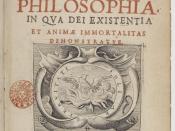In his sixth meditation must return to the doubts he raised in his first meditation. In this last section of his sixth meditation he deals mainly with the mind-body problem; and he tries to prove whether material things exist with certainly. In this meditation he develops his Dualist argument; by making a distinction between mind and body; although he also reveals their rather significant relationship.
Primarily he considers existence of the external world and whether our experience hold knowledge of this world or whether this knowledge is merely an illusion. He makes it quite clear how misleading some of external sensations can be. We are never sufficiently aware of subjectivity of our own thought and senses. The only thing we directly experience is the nature of our own ideas and we do not realise how our own appreciation of certain concepts may be very different from the objective character of the external world.
Descartes takes a look at memory, imagination, hallucination, dreams, predictions, etc. which he calls our (sensory awareness) as these are part of the way we perceive the external world, he doubts at first that any of these internal experience holds any truth or existence. As he is very sceptical he raises the problem whether any of these given experiences contain truth or objectivity at all. Since we never have the chance to stand outside our own perception, it is impossible to contrast it with the external world.
Descartes is hopeful to prove subsistence of the external world (physical objects located in space), and so he returns to a very basic stage and acknowledges the existence of minds as an immaterial substance and God. He then accepts that matter exists as long as it is not a projection of his own mind or God. As Descartes previously established...


